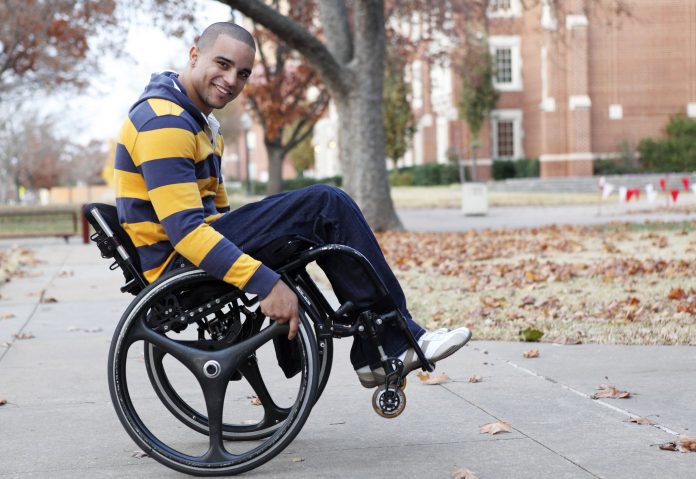This article is written by Vinit Gajjar, a law student from Jindal Global University.
World’s biggest minority, the first thing to come to our mind would be a racial sect or a religious group, right? However, what if I tell you ‘people with disabilities’ are classified as the biggest minority in the world. The Rights of Persons with Disabilities Act, 2016 defines a person with disability as, “a person with long term physical, mental, intellectual or sensory impairment which, in interaction with barriers, hinders his full and effective participation in society equally with others.”
Census of India calls attention to 2.68 crore people that is 2.21 per cent of the total population of our country is classified under the bracket of a person with disability. In India, the Criminal Procedure Code, 1973 is the key legislation for administrating the course of action for criminal law. If we scan the criminal procedure code for the term disability, only four sections contain provisions regarding this term. But on further analysis, provisions containing the term ‘infirmity’ is also seen. However, infirmity is a weakness or an ailment generally due to old age while disability is the state of deprivation, the absence of competence. Hence, these terms cannot be used interchangeably.
Although, Section 5 of the Criminal Procedure Code states “Nothing contained in this Code shall, in the absence of a specific provision to the contrary, affect any special or local law for the time being in force, or any special jurisdiction or power conferred, or any special form of procedure prescribed, by any other law for the time being in force” meaning the presence of special provisions will oust the jurisdiction of the criminal procedure code. Therefore, the Criminal Procedure Code is only a general provision, and it has to bow down to other special provisions. Thus, while analysing the rights of the disabled people under the criminal procedure code, provisions contained in the disability act, the evidence act and the legal services act also need to be taken into account.
The Criminal Procedure Code aims to relieve the disabled from excessive duties; they enjoy the right to demand the presence of a judicial magistrate who ensures that a person with a disability is comfortable during the modus operandi. Section 54(a), 154, 160, 164 of the Criminal Procedure Code mention the same. The criminal procedure code further ensures that the disabled person need not travel to places when the police need to get their witness statement recorded. They enjoy the right to have their statement recorded from their residence or any other place that is convenient to them. While recording statements from a disabled person, the criminal procedure code also states that the statements that are recorded need to be video-graphed, which safeguards the disabled, ensuring that the evidence provided by them isn’t manipulated due to their vulnerability. When a disabled person is categorically dumb or deaf, section 277 of the criminal procedure code elucidates the provision regarding the mode of language in recording the evidence, this section in the criminal procedure code does not explicitly provide for a right to voice the statements of the disabled. Although, section 119 under the Indian evidence act provides that – “A witness who is unable to speak may give his evidence in any other manner in which he can make it intelligible, as by writing or by signs; but such writing must be written and the signs made in open court. The evidence so given shall be deemed to be oral evidence.”
The ratio in State of Rajasthan v. Darshan Singh emphasised “A deaf or dumb person is a competent witness. If in the opinion of court, the oath can be administered to him or her, it should be done. If able to read and write, it is desirable to record his statement giving him questions in writing and seeking answers in writing. In the case witness is not able to read and write, his statement can be recorded in sign language with the aid of an interpreter if found necessary. It shall be deemed as oral evidence under Section 3 of the Indian Evidence Act.”
Hence, expanding on the rights of the disabled person acting as a witness. Moreover, Section 273 of the Criminal Procedure Code gives provisions regarding the collection of evidence in the presence of the accused. In the case – State of Maharashtra v. Dr Praful Desai, it was held that recording of the evidence by video conferencing was permissible. The ratio stated – “Section 273 contemplates constructive presence. This shows that actual presence is not a must. This indicates that the term ‘presence’ as used in the section, is not used in the sense of actual physical presence. Further evidence can be both oral or documentary and electronic records can be produced as evidence. This means that evidence, even in criminal matters, can also be a way of electronic records. This would include video conferencing.” This case can be used while interpreting section 273 of the criminal procedure code. The use of video conferencing as a medium to obtain evidence can be used to make this process of collecting evidence more comfortable, particularly for a person with a disability.
Section 11 of the criminal procedure code issues the provision regarding the courts of a judicial magistrate. The 45th Act of 1978 added to the original provision that – “The State Government may, after consultation with the High Court, establish, for any local area, one or more Special Courts of Judicial Magistrates of the first class or the second class to try any particular case or a particular class of cases, and where any such Special Court is established.” The amendment in the Rights to persons with disability act, 2016 bought an addition of special courts for people with disability in the case of Justice Sunanda Bhandare Foundation vs. Union of India – the supreme court ordered to set up special courts in each district to try offences against disabled persons.
A bench of Justice A. M. Khanwilkar, Justice Dipak Misra, and Justice M. M. Shantanagoudar directed to appoint a Special Public Prosecutor in every district to conduct a speedy trial in cases relating to people with disability. This decision by the apex court directed all Union Territories and States to file a report regarding the provisions in the Rights of Persons with Disabilities Act 2016. The Supreme court stated that the new statute operated in a broad spectrum to protect the rights of the disabled. This provision of the setting of a special court under section 11 of the criminal procedure code provides the people with a disability the right to speedy trials. In criminal cases against people with disability the case – Karamjeet Singh v. Union of India set a landmark judgement, while interpreting sections regarding the general provisions for inquires and trials along with when the person is of unsound mind (precisely in the Sections – 320(4)(a), 330(2), 335(1)(b) and 339) it declared that a writ petition by a third party as a ‘next friend’ could be applied for on behalf of the aggrieved party if the victim is a person with a disability. The ratio of the case gave the guideline that – “If a guardian or a next friend initiates proceedings for and on behalf of such a disabled aggrieved party, it is in effect proceedings initiated by the party aggrieved and not by a total stranger who has no direct personal stake in the outcome thereof.” Hence it is considered that the proceeding bought up by the person himself (who is disabled) – safeguarding the rights of the disabled.
Chapter 25 of the Criminal Procedure Code gives the provisions when the accused is of unsound mind. When an accused is of unsound mind, he/she is mentally impaired. Under the persons with disability act, mental retardation or mental illness was categorised as a condition of disability. Thus, a person with an unsound mind or mental illness is entitled to all the benefits available to the person with disability act. Section 304 of the criminal procedure code provides for legal aid at the state’s expense. In the case of Dinesh Das v. State, the victim was mentally unsound. Hence, Section 328 (a procedure in case of accused being lunatic) was applied, any lawyer did not represent the accused of unsound mind, and he did not pray for any legal aid during conviction, The critical question asked in the case was – when can legal aid be given to the accused when he made no prayer. This can be answered via a special provision provided under the Legal Services Act, 1987. Section 12(d) of the Legal Services Act specifically states that “Every person who has to file or defend a case shall be entitled to legal services under this Act if that person is – A mentally ill or otherwise disabled person.” Therefore, Section 304, when read along with Section 12(d) under the Legal Services Act, amounts to the entitlement of legal services of the disabled.
The legal service right of a person with a disability can also be inferred through the case of Aruna Shanbaug v. Union of India. In cases regarding euthanasia, the person who is in a vegetative state is disabled since they are physically and mentally impaired. In those cases, the advocate represents the disabled on their behalf. Hence, the victim in a vegetative state seeks the sanction through his advocate. However, the victim compensation under Section 357 of the Criminal Procedure Code does not accommodate any specific provision concerning to a person with a disability; the court has been flexible in interpreting Section 357 in such a way that benefits the victims especially the disabled.
As seen in the case Tekan v. State of Madhya Pradesh – the victim was a physically disabled person (blind). In this case, while providing the victim compensation, the court held that since the victim was disabled and had no family to look after her, a lump sum amount was not advisable since there was no way she would be able to manage herself. The ratio held that rather than giving a lump sum amount, she was provided with Rs.8000 per month for her entire lifetime. This aid was crucial in the aftermath of the crime committed against her. There exists a right to compensation the victims under the criminal procedure code, but a provision regarding lifetime compensation has not been mentioned in Section 357(a). This interpretation of the criminal procedure code in such a way can be used to support the rights of the disabled.
Justice is to be looked into aided by truth, the Criminal Procedure Code, 1973 is meant to serve the interest of justice, but it needs to be looked in with correspondence of all other specific provisions. Disability is by no means the problem rather accessibility to the people with disability has been the problem. If we search the Criminal Procedure Code, 1973 specifically for the term disability, only four Sections – 54(a), 154,160 and 164 have taken account for the rights of a ‘disabled’. Chapter 25 of the Criminal Procedure Code does speak on the people with a mental impairment that is unsound mind. Still, the definition given by the centre for disease control and prevention also takes into account for people who have a disability based on the function of their body, that is a person with a physical disability; which is not explicitly stated under the Criminal Procedure Code, 1973, and needs to be looked in other statutes.
https://t.me/joinchat/J_0YrBa4IBSHdpuTfQO_sA
Follow us on Instagram and subscribe to our YouTube channel for more amazing legal content.
 Serato DJ Crack 2025Serato DJ PRO Crack
Serato DJ Crack 2025Serato DJ PRO Crack











 Allow notifications
Allow notifications


